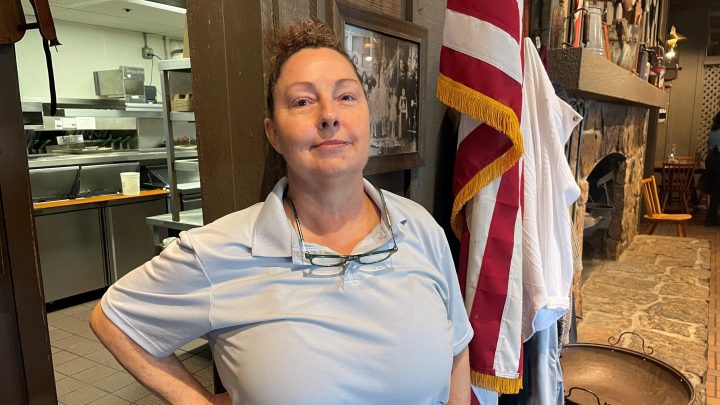
Texans brace for high electric bills as temperatures rise

Houston-area restaurant server Robin Wright is gearing up for yet another hot Texas summer.
Wright works two restaurant jobs six days a week to take care of her 12-year-old granddaughter. She knows how to make her money stretch. In the summer, that means never cranking up the air conditioner.
“I haven’t turned my electricity below 74 degrees in years,” Wright said, “because I can’t afford to pay the bill. I just take all the covers off. But I really would rather it be really cold and snuggle under the covers.”
Wright has experience adapting to extreme weather. She lost power for a week during the 2021 Texas freeze and evacuated her home for nearly a month after Hurricane Harvey in 2017.
“We adapt by wearing almost nothing inside the house. That’s all we can do,” she said.
In Houston, the energy capital of the world, low electricity prices are not a given. Some consumers are feeling the heat.
Electricity prices in the Houston area are up nearly 16% from a year ago, according to the Bureau of Labor Statistics. And in 2022, Texans paid twice as much for electricity compared to pre-pandemic prices, according to a recent analysis by the Federal Reserve Bank of Dallas.
Prices since then have stayed volatile, despite the low cost of the natural gas that powers much of the grid and reduced electricity prices in other parts of the country.
Ed Hirs, who teaches energy economics at the University of Houston, said that volatility is tied to how power plants in Texas get paid. “When those power plants are putting electricity into the grid is the only time they make money,” he said.
And, he added, plants make more money when electricity is tight.

Other grids are operated with more caution. They pay for capacity, which is essentially how much energy they might use. Paying for capacity means there is more of a cushion if there’s a cold snap or heat wave. Hirs compared it to funding the fire department.
“Nobody likes paying for extra capacity,” Hirs said. “But, think about it. We don’t use fire departments all day long, and we pay to keep them around.”
But Texas takes a deregulated approach, which means when demand for electricity suddenly jumps, prices go up 10, 20, 60-fold. That volatility is bad for consumers during extreme weather — but in previous years, this leaner approach has meant cheaper bills.
“Texas did experience very low prices for quite a while,” said Doug Lewin, an energy consultant and author of the Texas Energy and Power Newsletter.
But when the deadly freeze of 2021 knocked out electricity across the state, it was a wakeup call. Now, Lewin said, more money is being spent on capacity to create a greater cushion, as in other parts of the country. But that’s happening in an ad hoc manner — with no reform of the deregulated structure of the state’s energy market.
“That sort of leads to the worst of both worlds, frankly,” Lewin said.
He isn’t convinced that the grid is actually more reliable. “It’s open to interpretation what kind of reliability outcomes come from that,” he said. “What you definitely end up with is higher prices.”
The Texas grid is not only facing more scrutiny since the blackouts of 2021, but the summers are getting hotter, increasing peak electricity demand during heat waves, and more people and businesses are moving here every day.
Some people, like Hirs with the University of Houston, have said the state needs to build more natural gas power plants to come online when demand spikes.
Others, like Lewin, said Texas needs to address demand, for instance paying residents to conserve energy and investing in energy efficiency.
“That needs to be brought into the market both for reliability, because high demand is one of the biggest risk factors in whether or not we’re going to have blackouts, and to help lower bills,” he said.

But this summer, bills will continue to weigh on low-income Texans. And programs that help struggling families pay those bills have less money to help them, now that COVID-19 funds have dried up.
“The need for the program, the assistance, far outweighs the amount of funds that we have,” said Desiree Davis, who runs a utility assistance program at the nonprofit BakerRipley in Houston.
The program receives some aid requests after power has already been shut off. Last summer, BakerRipley helped 34 households get their lights back on during extreme heat.
In hot months, Davis said, electric bills can increase up to 50%, which can be especially tough for those on fixed incomes.
“When I was a customer service representative, there was a senior that I still work with to this day. She literally was considering taking her own life because she was struggling to pay her energy bills,” she said.
Many have to choose, she said, between keeping the power on and paying for medicine or food.
There’s a lot happening in the world. Through it all, Marketplace is here for you.
You rely on Marketplace to break down the world’s events and tell you how it affects you in a fact-based, approachable way. We rely on your financial support to keep making that possible.
Your donation today powers the independent journalism that you rely on. For just $5/month, you can help sustain Marketplace so we can keep reporting on the things that matter to you.











